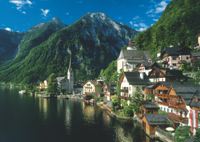|
By
Astrid Gasselhuber, Ph.D.
Pediatric Cardiology
Austria, often
confused with Australia, is a
small landlocked country, located
in the middle of Europe,
surrounded by no less than eight
other countries. Austria is about
the size of South Carolina and has
approximately twice as many
inhabitants. The Alps cover more
than 60 percent of Austria's
landscape, and perhaps this is why
skiing is one of the most popular
sports among the Austrians. Only
the area in the east, where the
Austro-Hungarian-
Empire-influenced capital Vienna
is located, does not have
mountains.
Austrian
culture has not only been largely
influenced by its eventful
history, but also by its past and
present neighbors, which shows in
its food, literature and
architecture, just to name a few
areas. Austria has been a member
of the European Union since 1995,
and the euro was introduced as its
currency in 2002.
 Austria, about the
size of South Carolina, is known
for its mountainous terrain. Austria, about the
size of South Carolina, is known
for its mountainous terrain.
The development
of the Austrian health care system
has roots back to the
Austro-Hungarian monarchy in 1867.
Today, health insurance is part of
the social security insurance
system, just as accident and
pension insurance are. The health
care system is based on
solidarity, to ensure medical care
independent of social status or
income. There is comprehensive
social health insurance coverage;
about 98 percent of the population
is protected. All employed people
in Austria and their employers
contribute equally to the system,
depending on their income.
Usually it is
not possible to choose a social
security institution, since it
depends on employer and location.
However, there is no competition
between the social security
institutions. Physicians typically
have a contract with the social
health insurance funds and
patients are free to choose a
general or specialist physicians.
Insured people
have the right to a large number
of covered services. Apart from
primary health care services and
emergency care, there also is a
wide range of health promotion and
prevention services offered. Since
1974, social health insurance
funds have offered annual
preventive health check-ups free
of charge. Private health
insurances typically cover
additional benefits or costs, such
as a higher comfort class in
hospitals.
In 2009, the
Austrian total health expenditure
was about $4,300 USD per capita,
compared to about $8,000 USD per
capita in the United States. There
are continuing political
discussions regarding structural
changes in the Austrian health
care system. However, surveys show
that a vast majority of Austrians
are highly satisfied with the
existing provided health care
services.
Fast
Facts
- "Silent
Night" was composed by a
primary teacher, Franz Gruber,
in a small Austrian village in
1859.
- Almost 90
percent of the population speaks
German, which is also the
official language.
- The energy
drink, Red Bull, is an Austrian
product.
- More than 68
percent of Austria's electricity
is supplied by renewable
sources.
- The candy,
PEZ, was invented in Austria.
- The sewing
machine was invented in 1818 by
Josef Madersperger, an Austrian.
- Soccer is a
popular sport in Austria.
However, the national side has
had little success over the
years.
Editor's
note: The Global Health
page focuses on raising
awareness of international
health issues through an
academic venue with the purpose
of improving the quality of care
for patients. E-mail
globalhealthnews@musc.edu.
International
Events
International
Thanksgiving Feast Celebration
Noon - 1 p.m., Thursday, Nov.
10
Harper Student Center
Auditorium
Presentations by local
Native Americans of theSantee
Tribe and Senior Brockingham
and Associate Archaeologist
Dr. Eric Poplin. All are
encouraged to bring a dessert
native to their country
International
'Sweet and Savory' Bake Sale
11 a.m. - 1:30 p.m., Friday,
Dec. 2
Portico and University
Hospital lobby
(across from Starbucks)
Purchase baked goods from
around the world and the
proceeds go to the
Hope Lodge Dinner and other
community outreach.
All
international activities can be
found online at http://www.musc.edu/international
or friend us on Facebook: MUSC
International Programs
|



 Austria, about the
size of South Carolina, is known
for its mountainous terrain.
Austria, about the
size of South Carolina, is known
for its mountainous terrain.